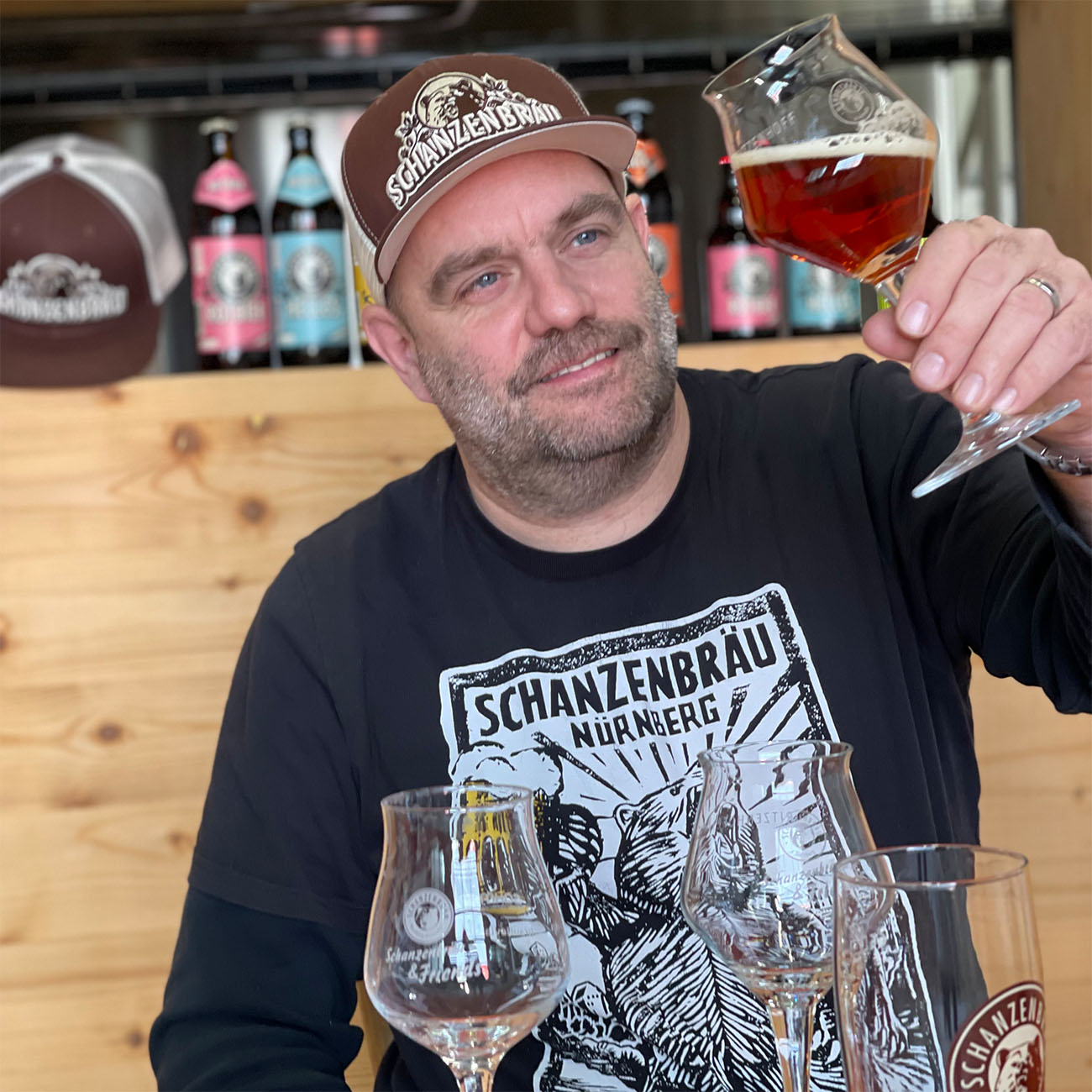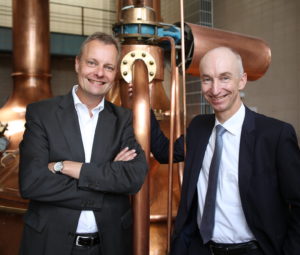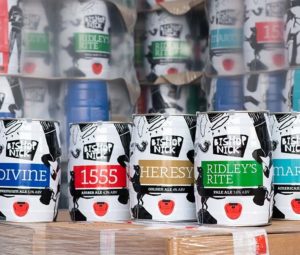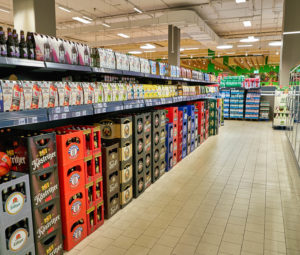Urban beer culture is close to Stefan Stretz’s heart. Even during his studies in the 1990s, he brewed “all kinds of crazy beers” together with the “Bier Company“ in Berlin. He then traveled halfway around the world for his job as a process optimizer for water management at a large detergent company. Until, by chance, he found himself back in his hometown of Nuremberg in 2003. In the basement of a backyard workshop on Bärenschanzstraße, where his buddies were working on American road cruisers, he brewed his first brew in disused wash kettles in 2004. The Schanzenbräu also got its name and the bear logo from this time.
First brewery built from scrap metal
The home-brewed beer from the Schanze is well received, and the workshop basement quickly became too small. In 2007, he moved into a former butcher’s shop in the Gostenhof district. Over the years, Stefan Stretz gathered the equipment for his first brewery. His job takes him to visit breweries, dairies, and beverage companies in Germany and abroad. Some of the things he found in scrap containers were put to good use. “Here a discarded valve, there a discarded lid – that’s how we built our own little brewery out of scrap, so to speak.” It has paid off: output is visibly increasing, and the beer from Gostenhof is selling like hot cakes at city festivals in the surrounding area.
Brewing rebel Stefan Stretz not only has a lot of rock’n’roll in his blood, but also a sense of tradition. “My hometown is simply close to my heart,” says the native of Nuremberg. That’s why he’s also keen to breathe new life into the run-down district of Gostenhof. With his Schanzenbräu, Stretz wants to be a pioneer in urban beer culture. This also includes a rustic pub. He opened it in 2008 in a vacant pub just a few streets away from his brewery. The “Schanzenbräu Schankwirtschaft” is a place of coziness in the good old style. In the wood-paneled dining room, regulars from the neighborhood play the “Schafkopf“ card game at one table, while a group of students enjoys their “Schäufele“ at the other.
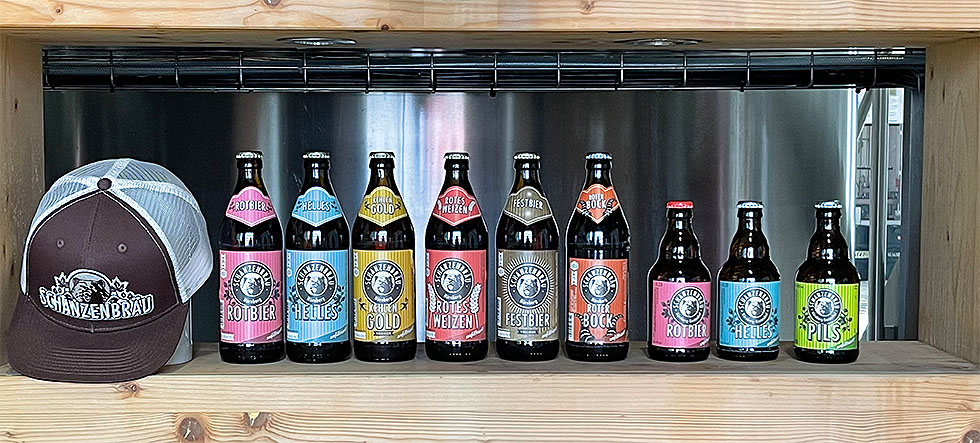
Pub cultivates the urban beer culture
“We are a neighborhood pub where people should feel at home,” says Stretz, describing his philosophy. That’s why there’s no music blaring from loudspeakers in the “Schankwirtschaft”. “The buzz of voices when people are talking is the most beautiful music for us,” explains the brewery boss. There are never more than 12 seats assigned as reservations – after all, people from the neighborhood should still be able to spontaneously find a seat and join in. Thousands of visitors regularly come to the annual brewery festival in the spring – “from punkers to pensioners. The Gostenhof Christmas market, which the brewery helps organize, has long had a permanent place in the events calendar. Stretz and his Schanzenbräu have played a major role in turning the former “glass shard district” of Gostenhof into Nuremberg’s trendy neighborhood.
For Stretz, urban beer culture is not (just) a hip, trendy pub, but a rustic tavern. And when it comes to his beer creations, he’s not jumping on the craft beer bandwagon, either, but instead relies on traditional varieties that he interprets in a modern way. Like the Rotbier, a typical Nuremberg beer variety, virtually a prototype of the unfiltered cellar beer. With his “Schanzenbräu,” Stretz has brought it out of obscurity and developed it further. According to Stretz, Schanzenbräu Rotbier is characterized by its “end-fermented, balanced malt sweetness and its fine, fruity hop character. At any rate, it is excellently received by beer drinkers and experts: At Meininger’s International Craft Beer Award 2019, it even won a gold medal!
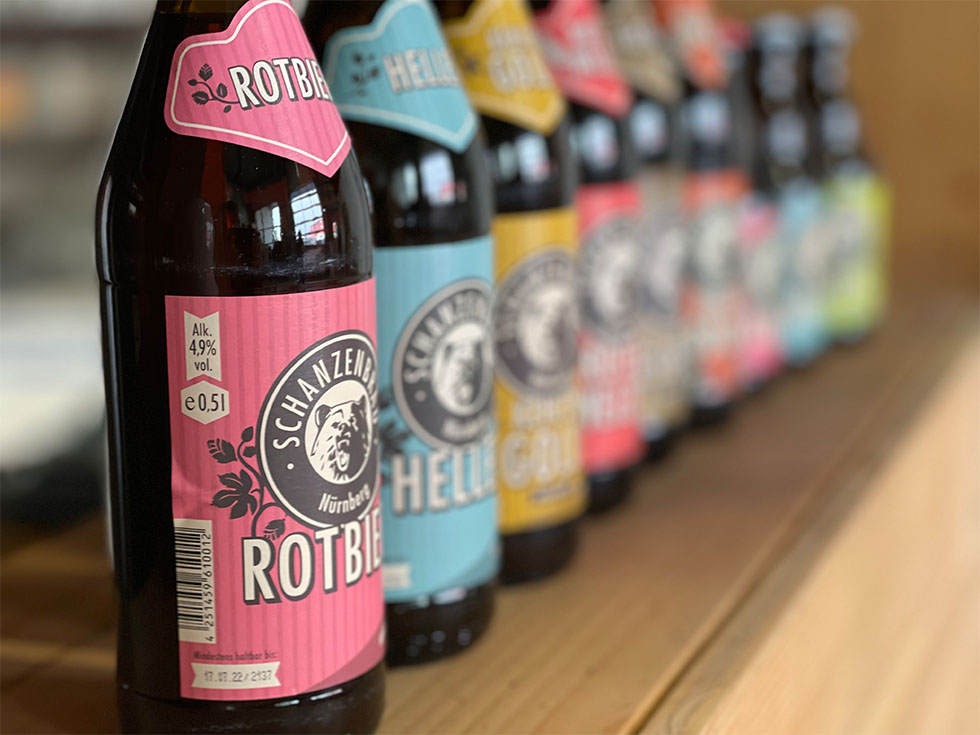
Schanzenbräu beers do not fit into any category
Even though he is pleased about the award, participation in beer competitions remains rather the exception for Stretz. Because he notes, “Our beers don’t really fit into any categories.” This is just as true for the brewery boss himself. The experimental backyard brewer has since become the managing director of Nuremberg’s largest private brewery. Ten years after the first brewing experiments in the wash tun, the groundbreaking ceremony for the new Schanzenbräu building in Nuremberg-Höfen followed. In 2018, just two years after the opening, the tank storage was increased in order to be able to brew other special beers in addition to the main varieties. In addition to Rotbier, Hellem, Kehlengold, and alcohol-free Rotbier Radler, Schanzenbräu also offers other limited and changing special beers such as Roter Bock, Märzen, Rotes Weizen, and Sommerbier.
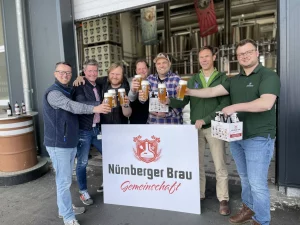
Brewing rebel and businessman. Craft beer brewer and traditionalist. Globetrotter and Bavarian ambassador. Stefan Stretz doesn’t allow himself to be pigeonholed. He is one thing above all: a team player. In 2020, he launched the Nuremberg Brewing Community to defy the Corona crisis with a jointly brewed beer, the “Zusammen Halbe,” according to the motto “One for all, all for one.” The joint initiative of nine Nuremberg breweries has now become an association dedicated to preserving Nuremberg’s brewing culture. Bringing both the big and the small together at one table is not always an easy undertaking. Stretz knows all too well, for example, the caveats about the supposed Nuremberg top dog Tucher Bräu, where he once learned how to brew himself. “But at the end of the day, we are all brewers with the same worries, hardships and challenges. We all have a family at home.”
Stretz can always rely on their support. His wife and children, his brother and parents – they all stand behind Schanzenbräu and give him the support he needs. “Without them, none of this would have worked.”
Even though the successful Schanzenbräu is not immune to crises (“During Corona, we had a 30 percent drop in sales, had to lay off several people…”) and the general price increases cause him concern (“For almost all raw materials and supplies, such as glass, gas, electricity, labels, malt, we are currently paying a good 30 percent more!”) – Stefan Stretz is convinced: It always goes on somehow. That’s why he appeals to his colleagues in the industry to always think outside the box, to exchange ideas and talk to each other. Because the passionate rugby player knows one thing from his own experience: “You can only make it as a team.”
